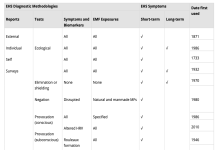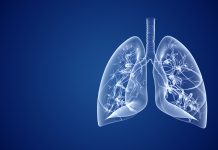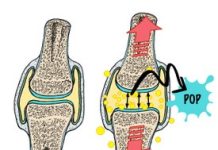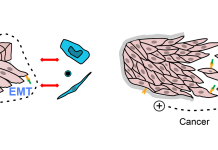Open Access Government produces compelling and informative news, publications, eBooks, and academic research articles for the public and private sector looking at health, diseases & conditions, workplace, research & innovation, digital transformation, government policy, environment, agriculture, energy, transport and more.
Home 2025
Archives
Asbestos: Early immune responses
Ujjwal Adhikari, Kinta Serve, and Jean Pfau explain how asbestos exposure negatively affects the body’s immune response and repair mechanisms, particularly through macrophage dysfunction. They emphasize that gaining a better understanding of cellular responses to inhaled particles could help researchers discover new therapeutic strategies for addressing environmentally induced conditions.
Ocular nutrition for a digital generation
Effective nutritional solutions to support healthy vision in children affected by Computer Vision Syndrome (CVS). Discover how healthcare professionals and policymakers can promote eye health and reduce the impact of screen time on kids.
The critical role of infection tolerance
Drawing on his research in understanding factors impacting infection tolerance, Brian P. Lazzaro, Liberty Hyde Bailey Professor at Cornell University, discusses the importance of tolerance to minor infections, highlighting that while active immune responses are crucial for pathogen defense, tolerance can often lead to better health outcomes.
Diagnosing electromagnetic hypersensitivity (EHS)
Michael Bevington, the Chair of Trustees at Electrosensitivity UK, outlines the various symptoms and diagnostic methodologies related to Electromagnetic Hypersensitivity (EHS), a condition first diagnosed in 1871.
Addressing the challenges of dementia care
Individuals living with dementia and their care partners often face numerous challenges that can lead to feelings of isolation. This article outlines how the Jockey Club Centre for Positive Ageing’s crisis management hotline service has become a vital resource for supporting the wellbeing of those affected by dementia.
Coaches help to reduce heart failure re-admissions
Professor James Calvin from Western University’s Department of Medicine presents his important research comparing two innovative methods for supporting patients in managing heart failure.
The microbiome in early life: Setting the stage for optimal early life health in...
Researchers at the University of South Florida Microbiomes Institute are exploring exciting new areas in microbiome research; here, they discuss the essential role that the microbiome plays in early life health.
Using machine learning to predict the severity of salmonella infection
David Ussery, a Professor in the Department of BioMedical Informatics at UAMS, and his student, Aakash Bhattacharyya, discuss using Machine Learning methods to predict the pathogenicity of a bacterial infection based on genome sequencing.
Manufactured chemicals: A significant contributor to chronic childhood diseases
Pamela J. Lein from the University of California, Davis, discusses manufactured chemicals as a significant contributor to chronic childhood diseases.
Antibiotics in tuberculosis treatment: Impacts on the respiratory microbiome and the role of optimal...
The respiratory microbiome plays a crucial role in maintaining immune regulation. In this article, Dr Wilber Sabiiti emphasizes the need for optimized antibiotic dosing strategies to minimize harmful effects on the microbiome and improve treatment outcomes for patients with TB.
Challenges in diagnosing and treating ADHD
Professor Deborah Winders Davis from the University of Louisville School of Medicine outlines the challenges in diagnosing and treating attention deficit hyperactivity disorder.
Joint sounds, how do they arise?
A key aspect of joint manipulation is the audible sounds that may occur during manipulation, which are believed to result from a phenomenon known as tribonucleation. Dr Rob Sillevis from.
Metabolic diseases and the brain: Obesity, type 2 diabetes and neurofibrosis
Garron Dodd, Head of the Metabolic Neuroscience Laboratory at The University of Melbourne, Australia and Founder, Chief Scientific Officer of Gallant Bio, investigates the brain ‘goo’ behind obesity and type-2 diabetes - and how we can treat it.
Daily cigarette smoking research from the Global Flourishing Study
Sung Joon Jang from the Institute for Studies of Religion, Baylor University and Pepperdine University, shares some of the new findings about daily cigarette smoking from the Global Flourishing Study.
Ovaries – The true beginning of a woman’s reproductive lifespan and healthspan
The ovaries play a significant role in a female’s overall reproductive health, which can affect susceptibility to age-related conditions. Dr. Paula Benny and Adjunct Assistant Professor Zhongwei Huang from the NUS Bia-Echo Asia Centre for Reproductive Longevity and Equality discuss the factors influencing reproductive lifespan and healthspan.
Cancers are like wounds because they are damaged tissue
Cancers resemble wounds. The question is why, and what does this mean? Many features of cancers – the so-called ‘Hallmarks of Cancer’ – may be mostly a wound-healing response. Dr Paul Edwards, Emeritus Reader at the University of Cambridge explores.
Menstruation – The female research advantage
While funding organizations are increasingly mandating equal representation of sexes and genders in research, hormonal fluctuations are still often viewed as complicating factors. Professor Belinda Pletzer argues for a shift in perspective, suggesting that the menstrual cycle should not be seen solely as a complicating factor, but as one of many variables influencing research.
The left atrial appendage arrhythmogenic and thrombogenic substrate
The left atrial appendage (LAA) is a significant source of strokes in patients with atrial fibrillation (AF). Helena Dominguez from the Department of Cardiology at the University of Copenhagen discusses the LAACS studies, which investigate the effects of LAA exclusion during heart surgery.
Semi-synthetic cannabinoids: A potent concern
Semi-synthetic cannabinoids have recently emerged as ‘lighter’ or ‘legal’ alternatives to cannabis, but they may be equally potent and equally risky, younger cousins.
Early intervention in the treatment of people with eating disorders
Tracey Wade from Flinders University highlights the benefits of early interventions for eating disorders. She notes that brief interventions during waiting periods can boost treatment completion rates, and early symptom improvements can lead to better outcomes.





















